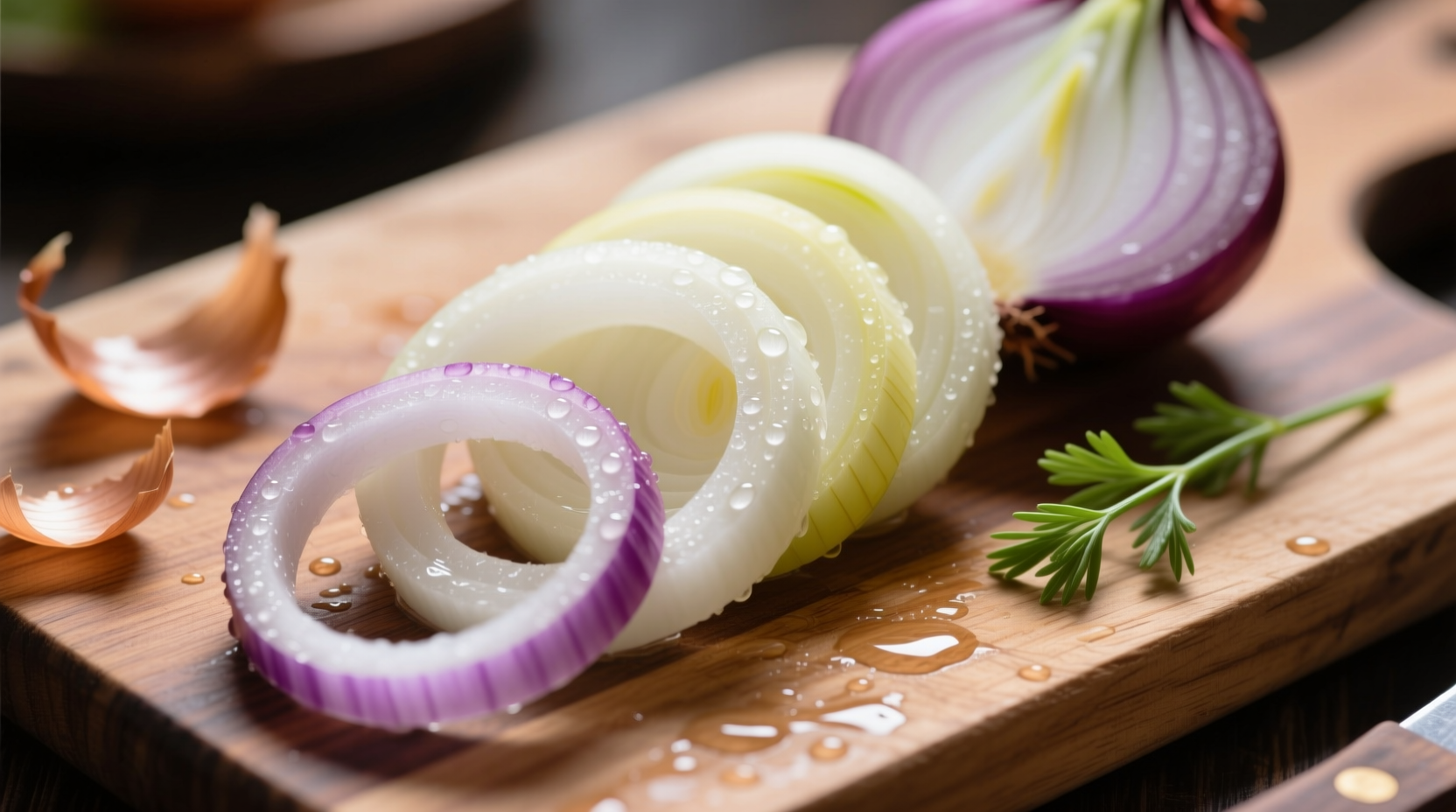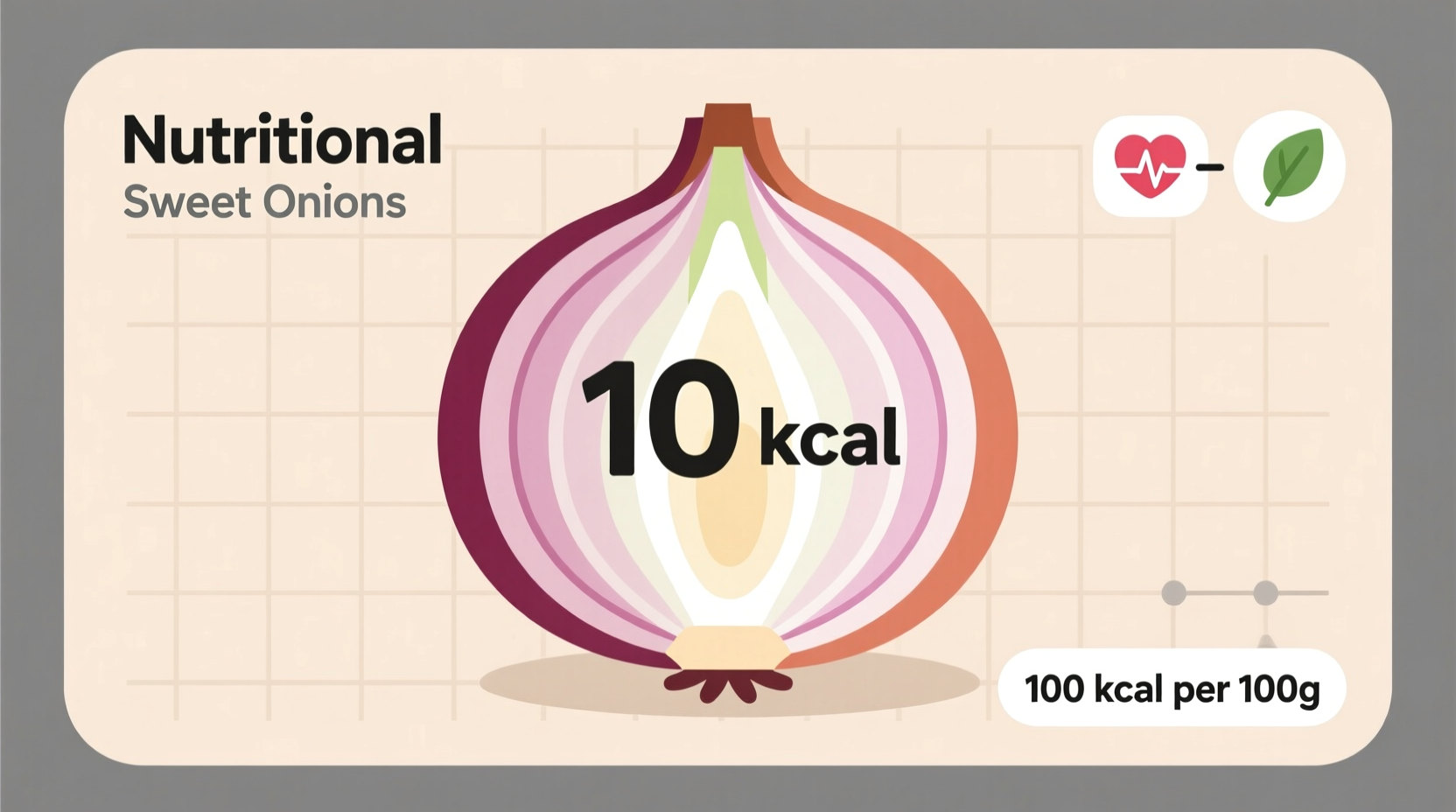One medium sweet onion (148g) contains approximately 64 calories, with 15g of carbohydrates, 0.2g of fat, and 1.7g of protein. A 100g serving provides about 43 calories, making sweet onions a low-calorie option for enhancing flavor in various dishes without significant impact on daily caloric intake.
Understanding the nutritional profile of sweet onions is essential for anyone tracking their dietary intake or looking to make informed food choices. Whether you're following a specific diet plan, managing weight, or simply curious about what you're consuming, having accurate calorie information at your fingertips can make a significant difference in your nutritional awareness.
Why Sweet Onions Are a Smart Culinary Choice
Sweet onions, known for their mild flavor and crisp texture, have become increasingly popular in kitchens worldwide. Unlike their sharper counterparts, sweet onions like Vidalia, Walla Walla, and Maui varieties contain higher sugar content but remain remarkably low in calories. This unique combination makes them versatile for both raw applications and cooking methods without dramatically altering your meal's caloric profile.
According to the USDA FoodData Central database, sweet onions offer more than just low calories—they provide valuable nutrients while enhancing flavor. Let's examine exactly what you're getting when you add sweet onions to your meals.
Nutritional Breakdown of Sweet Onions
Understanding the complete nutritional picture helps put calorie information in context. Here's a detailed breakdown per 100g serving of raw sweet onion:
| Nutrient | Amount | % Daily Value* |
|---|---|---|
| Calories | 43 kcal | 2% |
| Total Carbohydrates | 10.0 g | 4% |
| Dietary Fiber | 2.2 g | 8% |
| Sugars | 4.2 g | - |
| Protein | 1.1 g | 2% |
| Vitamin C | 7.4 mg | 12% |
| Vitamin B6 | 0.12 mg | 7% |
| Folate | 19 mcg | 5% |
| Potassium | 161 mg | 5% |
*Percent Daily Values are based on a 2,000 calorie diet. Your daily values may be higher or lower depending on your calorie needs.
This nutritional profile comes from the USDA National Nutrient Database for Standard Reference, Release 28, which serves as the authoritative source for nutritional information in the United States (fdc.nal.usda.gov).

How Sweet Onions Compare to Other Varieties
Many people wonder how sweet onions stack up against other common onion varieties in terms of calorie content. The differences are subtle but worth noting:
- Sweet onions: 43 calories per 100g
- Yellow onions: 40 calories per 100g
- Red onions: 40 calories per 100g
- White onions: 42 calories per 100g
- Green onions (scallions): 32 calories per 100g
The slight variation in calorie content primarily comes from differences in water content and natural sugar levels. Sweet onions typically contain about 4-5% sugar by weight compared to 3-4% in yellow onions, which explains their marginally higher calorie count.
Practical Applications in Meal Planning
Knowing the calorie content of sweet onions becomes particularly valuable when planning meals. Consider these practical scenarios:
For Weight Management
Adding 1/2 cup (75g) of chopped sweet onions to your salad contributes only about 32 calories while significantly enhancing flavor. This makes them an excellent substitute for higher-calorie flavor enhancers like croutons or bacon bits.
For Diabetic-Friendly Cooking
Despite their name, sweet onions have a relatively low glycemic load. One medium sweet onion contains approximately 15g of carbohydrates, which fits comfortably within most diabetic meal plans when accounted for properly.
For Low-FODMAP Diets
Those following a low-FODMAP diet for digestive health should note that sweet onions contain fructans. A serving size of 38g (about 1/4 cup chopped) is generally considered low-FODMAP, while larger portions may trigger symptoms in sensitive individuals.
How Cooking Methods Affect Calorie Content
The way you prepare sweet onions can influence their nutritional profile:
- Raw: Maintains all natural nutrients with 43 calories per 100g
- Grilled or roasted: Concentrates flavors as water evaporates; calorie density increases slightly to about 50 calories per 100g due to reduced water content
- Caramelized: Natural sugars concentrate during the cooking process; 100g of caramelized sweet onions contains approximately 65 calories
- Fried: Absorbs cooking oil, significantly increasing calorie content; 100g can reach 150+ calories depending on oil absorption
For those tracking calories precisely, weighing onions before and after cooking provides the most accurate measurement, as water loss during cooking changes the density of nutrients.
Health Benefits Beyond Calories
Sweet onions offer more than just low-calorie flavor enhancement. They contain several beneficial compounds:
- Quercetin: A flavonoid antioxidant with potential anti-inflammatory properties
- Allyl sulfides: Compounds associated with cardiovascular health benefits
- Dietary fiber: Supports digestive health and promotes satiety
- Vitamin C: Contributes to immune function and skin health
Research published in the journal Nutrients indicates that regular consumption of Allium vegetables (including onions) is associated with various health benefits, including potential reductions in cardiovascular disease risk factors. The complete nutritional package makes sweet onions more than just a flavoring agent—they're a functional food choice.
Smart Ways to Incorporate Sweet Onions Into Your Diet
Maximize the culinary and nutritional benefits of sweet onions with these practical tips:
- Add raw sweet onions to salads for crunch and flavor without significant calorie impact
- Use as a pizza topping instead of higher-calorie options like extra cheese
- Create a low-calorie relish by combining diced sweet onions with tomatoes and herbs
- Roast whole sweet onions as a side dish—no added fats needed
- Blend into soups and sauces for natural sweetness without added sugar
Remember that portion control remains important. While sweet onions are relatively low in calories, consuming them in very large quantities could still contribute significantly to your daily intake.
Common Questions About Sweet Onion Nutrition
How many calories are in a whole sweet onion?
A medium sweet onion (approximately 148g) contains about 64 calories. Larger sweet onions (200g) would contain around 86 calories, while smaller ones (100g) contain approximately 43 calories.
Are sweet onions good for weight loss?
Yes, sweet onions can be beneficial for weight loss as they're low in calories but high in flavor and fiber. The fiber content promotes satiety, helping you feel fuller longer with minimal caloric impact. Just be mindful of preparation methods—frying adds significant calories.
Do sweet onions have more sugar than regular onions?
Yes, sweet onions typically contain about 4-5% sugar by weight compared to 3-4% in yellow onions. This higher natural sugar content gives them their characteristic mild flavor but results in a slightly higher calorie count per equivalent weight.
How does the calorie content change when sweet onions are caramelized?
Caramelizing sweet onions concentrates their natural sugars as water evaporates. While 100g of raw sweet onion contains about 43 calories, the same weight of caramelized sweet onions contains approximately 65 calories due to the reduced water content and concentrated sugars.
Can I eat sweet onions on a low-carb diet?
Sweet onions can fit into a moderate low-carb diet in reasonable portions. One medium sweet onion contains about 15g of carbohydrates. For strict low-carb or keto diets, you may need to limit portions to 1/4 cup chopped (about 38g), which contains approximately 4g of net carbs.











 浙公网安备
33010002000092号
浙公网安备
33010002000092号 浙B2-20120091-4
浙B2-20120091-4